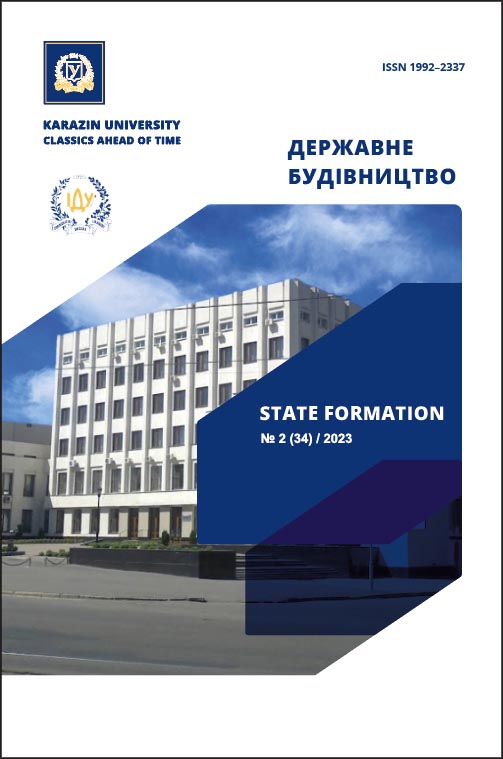The Issue of Alignment of Relationship between the State and Civil Society Institutions in Public Administration
Abstract
The paper studies the problem of harmonization of relationship between the state and civil society institutions in the context of restoring public consent and confidence.
The purpose of the article is to investigate the challenges of coordination of relations between the state and civil society institutions in public administration, to find the ways to increase social cohesion.
To achieve this goal, general scientific and special research methods were used, in particularly, as follows: analysis and synthesis – in the study of theoretical discourse; categorial and etymological analysis – in clarifying the basic concepts of "civil society", "public administration"; the combination of retrospective, situational and perspective approaches made it possible to observe the institutionalization of civil society and its impact on public administration.
It has been substantiated that with the formation of a civil society, a new period in the development of the state begins – the "modern representative state": nation-wide representative institutions of parliamentary type emerge and are established in the structure of state authorities. It is emphasized that, unlike the state, civil society is a horizontal system of various communications and relations between their associations, unions and communities. These connections are based on equality and personal initiative, including self-sufficiency.
A civilized modern state is a social state governed by the rule of law, with developed institutions of representative democracy, with various forms of self-government, with public state activities, where all officials are subordinated to the law and are controlled by representative institutions, a number of administrative structures' senior officers are elected, and officials are responsible before a fair general court. The types and features of legitimacy of power are also considered in the paper.
It has been substantiated that the role of legal culture of actors in the civil society is extremely important in the relations between the civil society institutions and the state.
Downloads
References
Alekseev V. M. Society and the state: administrative relations: monograph. Chernivtsi: Technoprint, 2012. 344 p.
Bielska T. V. Models of relationships between public authorities and institutions of civil society. http://www.kbuapa.kharkov.ua/e-book/apdu/2010-1/doc/1/18.pdf.
Bilokopytov D. The essence of civil society and its functions in modern conditions. Actual problems of public administration. 2016. No. 1 (49). P. 1–8.
Weber M. Sociology. General historical analyses. Politics [trans. with him Oleksandr Pohorily]. K. Basics. 1998. 534 p.
Hegel V.F. Phenomenology of spirit. K. Basics. 2004. 548 p.
Honyukova L. Basic principles of interaction of civil society institutions and state authorities in the implementation of standard-setting activities. Actual problems of public administration, pedagogy and psychology. 2013. Issue 2. P. 31–36. http://nbuv.gov.ua/UJRN/apdyptp_2013_2_7
Kononenko, V. and Lapshyn, S. (2020), “Civil society and the state: correlation in a public management”, Derzhavne upravlinnya: udoskonalennya ta rozvytok, [Online], vol. 8, available at: http://www.dy.nayka.com.ua/?op=1&z=1713. DOI: 10.32702/2307-2156-2020.8.1
Krutiy O. M. The public administration aspect of dialogue between authorities and the public: from the form of communication to the methodological basis. Bulletin of the Academy of the Customs Service of Ukraine. Ser. : Governance. 2011. No. 2. P. 7–13. http://nbuv.gov.ua/UJRN/vamcudu_2011_2_1
Krutiy O. M. The current state of dialogue communication between state authorities and the public in Ukrainian society. Public administration: improvement and development. 2012. No. 2. http://nbuv.gov.ua/UJRN/Duur_2012_2_3
Kryukov O. I. Communication of government and society as a factor in the implementation of information security policy. Bulletin of the National University of Civil Defense of Ukraine. Series: "Public Administration" 2017. 1(6). 201–207.
Lipovska N.A., Alekseev V.M. Relations between the state and society: academic. manual D. DRIDU NADU. 2019. 180 p.
Lukin S.Yu. Civil society in the formation of public space in the processes of state formation. Public administration and customs administration. 2020. No. 2 (25). P. 99 – 103. DOI https://doi.org/10.32836/2310-9653-2020-2.18
Lutsyshyn V. The influence of civil society institutions on the process of national consolidation in modern Ukraine. Proceedings. 4(78). 22-32. https://ipiend.gov.ua/wp-content/uploads/2018/07/lutsyshyn_vplyv.pdf
Radchenko O.V., Krutiy O.M., Parubchak I.O. Public dialogue as a system-creating phenomenon of the latest state policy in Ukraine. Public administration: theory and practice. 2014. Issue 4. P. 158–165. http://nbuv.gov.ua/UJRN/Pubupr_2014_4_26.
Usachenko L. State authorities and non-governmental organizations: functions of the system of mutual relations. Bulletin of the National Academy of Public Administration under the President of Ukraine. 2009. Issue 1. P. 183–191. http://nbuv.gov.ua/UJRN/Vnadu_2009_1_25.
Chaltseva O.M. The role of civil society in designing public policy in Ukraine. Bulletin of the Donetsk National University named after Vasyl Stus. 2020. 5. DOI: https://doi.org/10.31558/2617-0248.2020.5.10
Shaulska, H. (2021). Public governance and transformation Ukrainian model of civil society. Public Administration Aspects, 9(1), 35-43. https://doi.org/10.15421/152102

